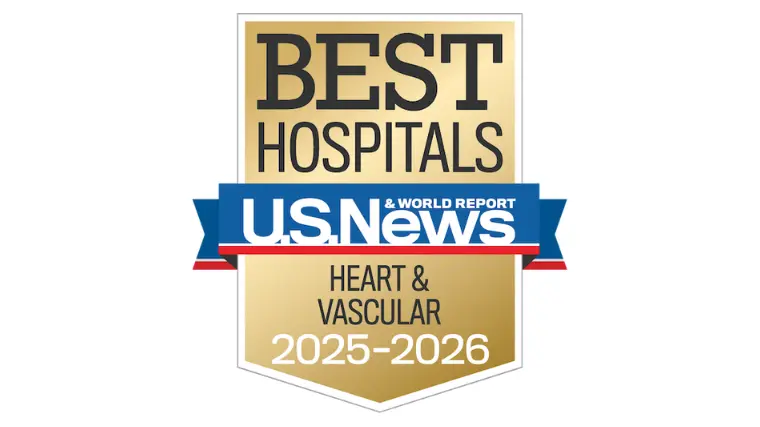Congenital Heart Disease in Adults
Congenital heart disease (CHD) – a heart condition that someone is born with – is the most common birth defect in the country. With the continued advances in medicine, children born with heart defects are surviving in to adulthood, with over 1 million adults in the United States are living with congenital heart disease today. As an adult CHD patient, ongoing care is required to have sustainable healthcare success, and finding the right team is essential to ensure you get the care you deserve.
What is congenital heart disease?
Congenital heart defects (CHD) develop before birth when one or more heart structures (valve, walls and/or vessels) have abnormal formations, weaknesses or other flaws that prevents normal heart functions. As an adult with a congenital heart disease, over your lifetime, your heart can weaken, become damaged or lead to serious comorbidities, such as heart failure, arrhythmias or coronary heart disease.
Symptoms of Congenital Heart Disease
Congenital heart disease symptoms are not always apparent or can develop later in live, but for those that do have symptoms, they might experience one or more of the following:
- Irregular heartbeat (arrhythmia)
- Difficulty breathing or shortness of breath
- A blue or purple tint all over the skin
- Swelling (body or organs)
- Lightheadedness, fainting or dizziness
- Less of stamina in daily activities
- Leg swelling
- Chest pain
If you experience one or more of the above symptoms, see your physician for an evaluation.
Congenital Heart Disease Causes and Risks
Congenital heart disease can develop for many reasons, such as hereditary or genetic anomaly, but CHD can also be intensified when you have a comorbidity that increases your risk of additional health concerns. Common causes of CHD include:
- Maternal factors (smoking and/or drinking while pregnant, taking certain medications during pregnancy)
- Viral infections
- Hereditary conditions (family history of CHD)
- Genetic defects (Marfan syndrome, Ellis-van Creveld syndrome, Holt0Oram syndrome)
- Chromosome abnormalities (Down syndrome, Turner’s syndrome, Willams syndrome)
Risk Associated with CHD
If you were born with a congenital heart disease, you have a higher risk of developing other heart disease, such as:
- Arrhythmias (such as atrial fibrillation, ventricular tachycardia)
- Endocarditis (an infection in the heart)
- Stroke
- Hypertension
- Heart failure
Why Choose UChicago Medicine for ACHD
The University of Chicago Medicine has the experts you need for congenital heart disease (ACHD) care in adults. Our team understands that ACHD patients will face lifelong risks because of their condition(s), but our expertise in medical and surgical management, as well as our specialized ACHD long-term, follow-up care provides the critical treatment you deserve.
We have a multidisciplinary team that brings a wide range of specialists together to work in tandem on your care in order to minimize any risks or concerns in all other aspects of your healthcare. UChicago Medicine knows that you need a team that sees beyond just treating congenital heart disease (CHD), but is there to help you with the long term emotional, psychological and financial concerns that are CHD and comorbidities (such as valve disease, arrhythmias or heart failure) associated with these conditions.
Transitioning Congenital Heart Care for Adults
UChicago Medicine’s ACHD program specializes in transitioning patients from pediatric to adult care. Because most pediatric congenital heart diseases will continue into adulthood, we understand that the risks, stresses and healthcare issues adjust throughout their lives. Our goal is to provide comprehensive care throughout each stage of their healthcare journey. For adult CHD patients, our program includes a wide range of specialists spanning the organization who can address your varied and unique health concerns.
Nationally Recognized for Marfan Syndrome and Connective Tissue Diseases
Our Marfan Syndrome and Connective Tissue Program has been nationally recognized as a center of excellence (COE) for its exceptional work in the diagnosis and management of Marfan syndrome and related connective tissue disorders in adults and children. As one of only two centers of excellence in Illinois, this designation demonstrates our commitment to providing the highest quality care and ensuring that each patient receives the comprehensive, personalized treatment they deserve.
Pregnancy and Fertility for Congenital Heart Disease Patients
Congenital heart disease affects women differently than men. Our comprehensive fertility, sexual function and pregnancy program for women with congenital heart disease brings together experts from a variety of specialties, including obstetrics, gynecology and cardiology, to address these challenges. We focus on helping women manage their condition(s) before, during and after pregnancy.
Q&A: Preparing for a healthy pregnancy with adult congenital heart disease (ACHD)
Contact Us
For general questions about our adult congenital heart disease (ACHD) program, please contact us at 773-702-7777.
Nationally Ranked in Cardiology, Heart Surgery and Vascular Surgery

Request an Appointment
We are currently experiencing a high volume of inquiries, leading to delayed response times. For faster assistance, please call 1-773-702-9461 to schedule your appointment.
If you have symptoms of an urgent nature, please call your doctor or go to the emergency room immediately.
You can also request an online second opinion from our specialists
* Indicates required field
